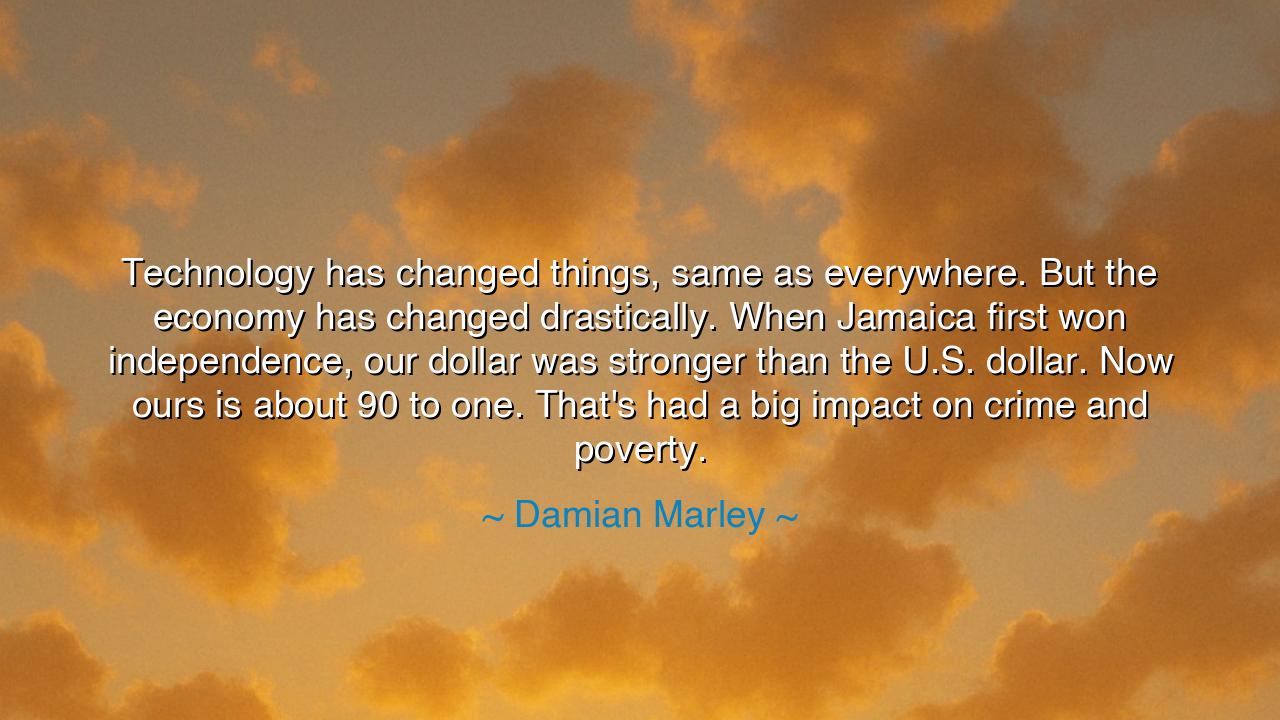
Technology has changed things, same as everywhere. But the
Technology has changed things, same as everywhere. But the economy has changed drastically. When Jamaica first won independence, our dollar was stronger than the U.S. dollar. Now ours is about 90 to one. That's had a big impact on crime and poverty.






Hear the voice of Damian Marley, son of a legend and prophet in his own right, who gazed upon his homeland and spoke with the wisdom of remembrance: “Technology has changed things, same as everywhere. But the economy has changed drastically. When Jamaica first won independence, our dollar was stronger than the U.S. dollar. Now ours is about 90 to one. That’s had a big impact on crime and poverty.” These are not words of complaint, but of lament — the lament of a child of freedom who has watched his nation’s bright dawn dim into struggle. Within them lies a lesson about prosperity and decline, about freedom and responsibility, and about how the soul of a people must be guarded as carefully as its wealth.
In the days when Jamaica first won independence, the air was thick with promise. The chains of colonialism had been broken, and the spirit of the island pulsed with pride and hope. A young nation stood before the world, rich in culture, music, and the rhythm of life itself. Its currency was strong, its people eager to build a new destiny. Yet as the decades passed, storms came not from the sea, but from within — storms of economic imbalance, of corruption, of inequality. The dollar, once strong, fell and kept falling, until it became a shadow of its former power. And as the currency weakened, so too did the pillars of social peace.
Marley’s words reveal a truth older than nations: when wealth decays, virtue is tested. For when the bread grows scarce, and the cost of living outpaces the strength of the people, the shadows of crime and poverty rise. Hunger breeds desperation, and desperation can turn even the kind-hearted toward darkness. In such times, the songs of joy that once filled the streets are replaced by cries of struggle, and the young who once dreamed of greatness may be drawn instead to the path of survival. Thus, the fall of a currency is not merely an economic matter — it is a wound to the spirit of a people.
Let us remember the story of Rome, the eternal city that once ruled the world. In her glory, her gold was pure, her armies vast, her people proud. But when greed and mismanagement took hold, her coin was debased, her economy weakened, and her unity shattered. Inflation soared, corruption spread, and soon the empire that had conquered continents could not feed its own citizens. From that decay, invaders came — but they were not the true destroyers. Rome had already fallen from within. So too does Damian Marley warn his generation: that no nation, however blessed in culture or history, can endure if its economic heart is allowed to falter.
Yet, there is hope in this message, for Marley’s lament is also a call to awakening. Technology, he says, has changed things — and indeed, in that change lies both peril and promise. For technology, if guided by wisdom, can be the tool by which a nation rises again. It can connect the farmer to the market, the student to the world, the entrepreneur to opportunity. But if it serves only vanity or escapism, it will deepen the wound it should heal. Technology must serve humanity, not enslave it. In this lies the balance between progress and preservation.
To the children of Jamaica, and to all who listen beyond its shores: take this as a lesson of vigilance. Freedom, once won, must be maintained not by song alone, but by stewardship — of resources, of values, and of people. Let not the wealth of your nation slip into the hands of a few while the many starve. Let education be your weapon, innovation your art, and justice your law. The fall of a dollar is but a symptom; the true disease lies in neglecting the dignity of your people.
So, my children, heed this truth: the strength of a nation is not measured by the number stamped upon its coin, but by the integrity of its heart. Wealth without compassion is ruin, and poverty without hope is despair. If you would restore what was lost — whether in your nation or your own life — you must rebuild from within. Nurture your communities, honor your elders, uplift your youth, and use the gifts of technology not to flee your reality, but to transform it. For as Damian Marley reminds us, the music of freedom must not only be sung — it must be sustained.
And when you see the world changing around you, do not curse the change, but shape it. Let every innovation serve justice, and every advancement uplift the poor. In doing so, you will restore not just the strength of your economy, but the harmony of your soul. For the wealth of a people is not in their currency, but in their unity — and the nation that guards its humanity will never be poor.






AAdministratorAdministrator
Welcome, honored guests. Please leave a comment, we will respond soon